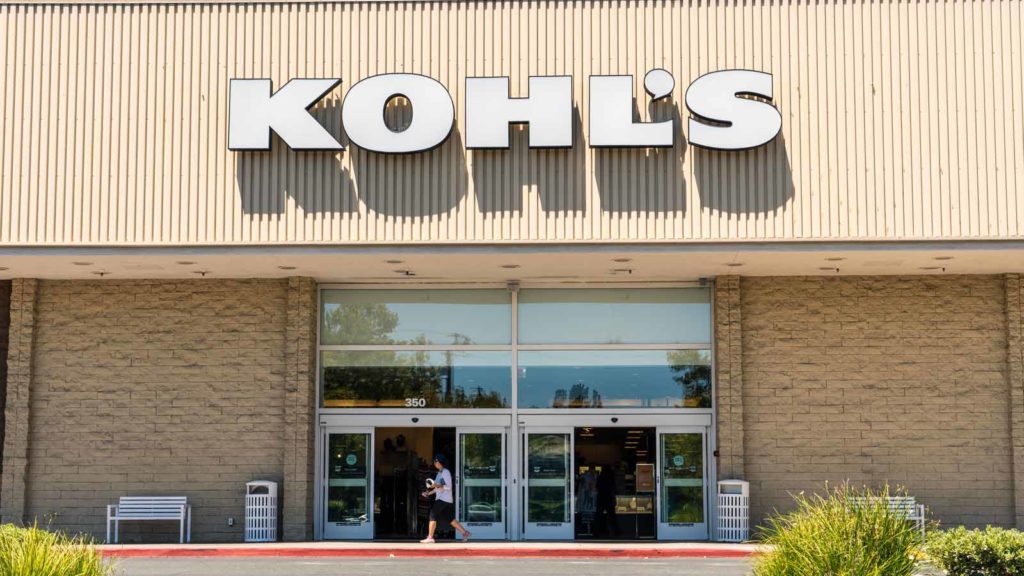Kohl’s (NYSE:KSS) and Kohl’s stock don’t look like winners in the short term or the long term. The retailer just doesn’t appear to have what it takes to succeed during the novel coronavirus crisis in particular or the e-commerce revolution in general.

For retailers with hundreds of brick-and-mortar stores to thrive in this era, I think they need a very strong brand or a powerful e-commerce business or they need to be the best in their category. Kohl’s appears to have none of those characteristics.
I’ve never heard anyone say, “I really like shopping at Kohl’s.” In the handful of times I’ve been in its stores in the past ten years, they’ve never been crowded.
Losing Ground Before Covid-19
Even before the pandemic, when the economy was growing rapidly, the chain was losing ground. Its comparable sales sank 1.3% in 2019, and its net income fell to $691 million last year from $801 million in 2018. The retailer’s top line declined to $19.97 billion in 2019 from $20.23 billion in 2018.
The company has not become an e-commerce giant. For much of its first quarter, which ended on May 2, e-commerce was booming. But its Q1 top line came in at just $2.4 billion, down 43.5% year-over-year, and it reported a large per-share loss of $3.52.
Finally, Kohl’s is clearly not the strongest department store chain. Based on multiple metrics, TJX (NYSE:TJX) and Macy’s (NYSE:M) are stronger than Kohl’s. In TJX’s fiscal 2020, its net sales surged to $41.7 billion from $38.97 billion in FY18, and its earnings per share climbed to $2.67 from $2.43.
Macy’s net sales slipped just 0.8% in 2019, meaningfully less than Kohl’s 1.3% decline. Further, Macy’s bottom line, excluding certain items, tumbled 30% year-over-year. But its adjusted net income came in at $906 million, well above Kohl’s $691 million. And Macy’s 2019 operating income actually rose 3.9% YOY to $970 million, while Kohl’s operating income fell to $401 million from $441 million.
What Keeps Kohl’s Stock From the Top?
Kohl’s isn’t viewed as selling quality items at affordable prices like TJX’s stores or Gap’s (NYSE:GPS) Old Navy, but it’s not seen as having high-quality clothing like Macy’s or Nordstrom (NYSE:JWN). As a result, nothing about Kohl’s strongly entices consumers to shop there.
I’m also not too thrilled about Kohl’s main strategic initiatives. Accepting returns from Amazon (NASDAQ:AMZN) will mostly attract consumers who like shopping online and are looking for affordable items. Kohl’s doesn’t excel in either area.
Kohl’s decision to allow Planet Fitness (NYSE:PLNT) to open gyms nears Kohl’s stores also, in my opinion, isn’t likely to greatly boost Kohl’s results. When I go to the gym, I’m usually pressed for time, and I want to get my workout done and go home immediately afterward. I’m sure many if not most people feel similarly.
Macy’s strategy of launching discount stores, known as Backstage, that will likely employ the successful strategies of Old Navy and TJX, is much more likely to be successful than Kohl’s deals with Amazon and Planet Fitness.
As I noted in 2018, Macy’s has multiple other positive catalysts, including the strong loyalty of its customers and its efforts to make 150 of its stores more exciting and technologically advanced.
Finally, some on the Street are bullish on Kohl’s and Kohl’s stock largely because most of the retailer’s stores are not located in malls. But that won’t prevent Kohl’s from having major problems. Plenty of retailers whose stores are primarily located in strip malls have gone bankrupt; think Toys R Us, Circuit City, and Pier 1 (OTC:PIRRQ).
The Bottom Line on Kohl’s Stock
Kohl’s attributes leave it poorly positioned to compete effectively in today’s world, and its strategies are not going to improve its situation much going forward. Given these points, investors should sell Kohl’s stock.
Those who want to bet on a retail comeback story should buy the shares of TJX or Macy’s instead.
Larry Ramer has conducted research and written articles on U.S. stocks for 13 years. He has been employed by The Fly and Israel’s largest business newspaper, Globes. Larry began writing columns for InvestorPlace in 2015. Among his highly successful, contrarian picks have been GE, solar stocks, and Snap. You can reach him on StockTwits at @larryramer. As of this writing, Larry Ramer owned shares of TJX.
